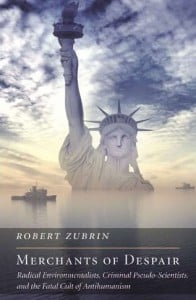Merchants of Despair: Radical Environmentalists, Criminal Pseudo-Scientists, and the Fatal Cult of Antihumanism, by Robert Zubrin. New York: Encounter Books, 2012. 328 pp. $25.95 (hardcover).

Did you know that the U.S. government subsidizes forced sterilization of women throughout the Third World, and that both Republican and Democratic administrations have supported this policy? This is just one evil among many that Robert Zubrin documents in Merchants of Despair: Radical Environmentalists, Criminal Pseudo-Scientists, and the Fatal Cult of Antihumanism.
Zubrin’s thesis is this: “Antihumanist” movements implicitly or explicitly hold that “humans are a cancer upon the Earth, a horde of vermin whose unconstrained aspirations and appetites are endangering the natural order” (p. 6). Among these movements are Malthusianism (population control), eugenics, and the campaigns against DDT, nuclear power, “global warming,” and genetically modified food.
Zubrin, a nuclear engineer and an amateur historian, writes in clear, nontechnical language—often eloquently, and sometimes passionately—and he has done his research: eighty of the book’s three hundred pages are devoted to references and notes.
For each movement, Zubrin provides a “focus section” in which he debunks propaganda by reference to facts. Population control and its sister movement, eugenics—which span the late 18th century to the present and across many countries—are Zubrin’s central focus in the book. He addresses these over the course of ten chapters, each devoted to a different era or country. He covers the other movements in separate chapters interspersed between the ten on population control and eugenics. This alternating back and forth between topics is jarring, but it aids Zubrin in showing how the various movements are interconnected historically and philosophically.
I’ll focus on Zubrin’s discussions of population control and eugenics because these movements are central to his argument and less familiar to most people. I’ll then touch on the other topics he covers.
Zubrin’s inquiry begins with Thomas Malthus (1766–1834), “the founding prophet of modern antihumanism” (p. 10): an Anglican priest, political economist, and professor at East India College in Hertfordshire, England. Malthus rejected the Enlightenment view “that human liberty, expanding knowledge, and technological progress could ultimately make possible a decent life for all mankind” (p. 10). In his Essay on the Principle of Population (1798), he maintained that population will always expand faster than resources; thus, population growth must be controlled, or everyone will starve. Zubrin considers the following quote to be Malthus’s recipe for population control:
We are bound in justice and honor to disclaim the right of the poor to support. . . . [We] should facilitate, instead of foolishly and vainly endeavoring to impede the operations of nature in producing this mortality; and if we dread the too frequent visitation of the horrid form of famine, we should sedulously encourage the other forms of destruction, which we compel nature to use. Instead of recommending cleanliness to the poor, we should encourage contrary habits. In our towns we should make the streets narrower, crowd more people into the houses, and court the return of the plague. In the country, we should build our villages near stagnant pools, and particularly encourage settlements in all marshy and unwholesome situations. But above all, we should reprobate the specific remedies for ravaging diseases; and those benevolent, but mistaken men, who have thought they were doing a service to mankind by projecting schemes for the total extirpation of particular disorders. (p. 10)
Zubrin quite reasonably sees this as a call for society to effectively exterminate its weaker members.
Du


![[TEST] The Objective Standard](https://test.theobjectivestandard.com/wp-content/uploads/2017/10/logo.png)













